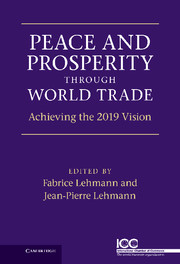Book contents
- Frontmatter
- Contents
- Notes on contributors
- Foreword
- Preface: the ICC vision
- Historical overview and dynamics
- Editorial note
- A Global systemic transformations
- B Governance of global trade
- Editorial introduction
- B1 Securing the global trade regime: the demand for global governance
- B2 The trade regime and the future of the WTO
- B3 WTO reform: the time to start is now
- B4 ‘Murky protectionism’ and the WTO
- B5 Preferential trade agreements: imagining a world with less discrimination
- B6 The G-20 after the Great Recession: rebalancing trade
- B7 The missing piece: global imbalances and the exchange rate regime
- B8 Trading knowledge fairly: intellectual property rules for global prosperity and environmental sustainability
- B9 Trade and subsidies: undermining the trading system with public funds
- B10 Trading labour: a dilemma for migration regimes
- C Poverty and global inequities
- D The long view on interlocking crises
- E Global business responsibilities
- Conclusion: the imperative of inclusive global growth
- Index
B4 - ‘Murky protectionism’ and the WTO
Published online by Cambridge University Press: 05 July 2011
- Frontmatter
- Contents
- Notes on contributors
- Foreword
- Preface: the ICC vision
- Historical overview and dynamics
- Editorial note
- A Global systemic transformations
- B Governance of global trade
- Editorial introduction
- B1 Securing the global trade regime: the demand for global governance
- B2 The trade regime and the future of the WTO
- B3 WTO reform: the time to start is now
- B4 ‘Murky protectionism’ and the WTO
- B5 Preferential trade agreements: imagining a world with less discrimination
- B6 The G-20 after the Great Recession: rebalancing trade
- B7 The missing piece: global imbalances and the exchange rate regime
- B8 Trading knowledge fairly: intellectual property rules for global prosperity and environmental sustainability
- B9 Trade and subsidies: undermining the trading system with public funds
- B10 Trading labour: a dilemma for migration regimes
- C Poverty and global inequities
- D The long view on interlocking crises
- E Global business responsibilities
- Conclusion: the imperative of inclusive global growth
- Index
Summary
Without international commerce living standards would be fettered by national resources, prejudices and spending. Perhaps more importantly, international commerce also provides new vistas to explore, creating opportunities unavailable in traditional, hidebound societies. It is no wonder that such freedom is feared by insecure rulers and elites, those unwilling or unable to compete, and those yearning for yesteryear. Until the recent sharp global economic downturn, the latter had been on the defensive for nearly twenty-five years as countries of all types integrated further into the world economy, so creating greater freedoms for their citizens and firms. Will the current crisis provide the pretext for limiting that freedom and what are the implications for the WTO?
The enemies of opportunity know that outright protectionism of the 1930s type is politically unviable. Smoot and Hawley are names that have gone in infamy; nobody wants to be their heir. So new tactics are employed and what better than to subvert the implementation of legitimate state functions to protectionist ends. In the first instance criticism can be deflected by pointing to the legitimate purpose of the measure in question, with the hope that the analyst, journalist, or voter in question is too bored or too lazy to ask whether any noble policy objective could be accomplished at less cost to international commerce. Murky protectionism has increasingly replaced outright protectionism as the reactionary's international economic policy of choice.
- Type
- Chapter
- Information
- Peace and Prosperity through World TradeAchieving the 2019 Vision, pp. 89 - 92Publisher: Cambridge University PressPrint publication year: 2010
- 3
- Cited by

